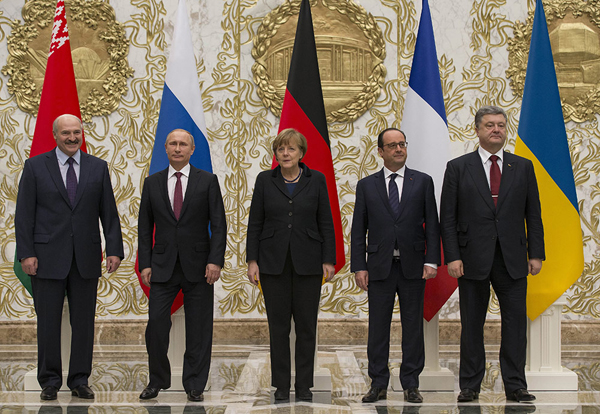Ukraine peace deal brokered after marathon talks
 0 Comment(s)
0 Comment(s) Print
Print E-mail China.org.cn, February 12, 2015
E-mail China.org.cn, February 12, 2015
The leaders of Ukraine, Russia, Germany and France on Thursday agreed a peace deal to end fighting in eastern Ukraine, following 14-hour marathon talks in the Belarusian capital of Minsk.
|
 |
|
The leaders of Ukraine, Russia, Germany and France on Thursday announced a peace deal for an end to fighting in eastern Ukraine, following 14-hour marathon talks in the Belarusian capital of Minsk. [Photo/Xinhua] |
The agreement envisages a ceasefire between Ukrainian forces and independence-seeking insurgents starting on Sunday, followed by the withdrawal of heavy weapons from the front line and constitutional reform to give eastern Ukraine more autonomy.
It was signed by leaders of the self-proclaimed Donetsk and Lugansk People's Republics, a representative of the Organization for Security and Cooperation in Europe (OSCE), former Ukrainian president Leonid Kuchma and Russia's ambassador to Ukraine.
A previous ceasefire agreed in September fell apart as Ukrainian government forces and pro-independence insurgents both tried to gain more ground.
Russian President Vladimir Putin told reporters that the parties "have managed to agree on the main issues," including the withdrawal of heavy weapons from the conflict area, a special status for Ukraine's eastern regions, provisions on border controls, and humanitarian issues.
Meanwhile, all sides also stressed that disagreements remained after the talks.
Ukrainian President Petro Poroshenko said there was a "great deal of tension" in the talks, adding that no agreement had been reached on autonomy for Ukraine's Russian-speaking eastern regions, a longtime demand of Russia.
German Chancellor Angela Merkel and French President Francois Hollande acknowledged that more work needs to be done despite the temporary peace deal.
Alexander Zakharchenko, leader of the self-proclaimed Donetsk People's Republic, put the entire responsibility for a possible breach of the agreement on Kiev.
"The whole responsibility for any possible violation of the provisions of this memorandum will rest upon Petro Poroshenko," he said.
Thursday's meeting is seen as the high point of intensive multilateral efforts aimed at finding a way out of the crisis in Ukraine, where more than 5,300 people have been killed since April last year.
The outcome of the Minsk talks is expected to influence discussions at an EU summit in Brussels on Thursday, when sanctions against Moscow will be on the agenda.





